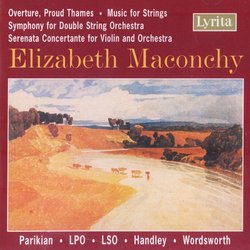Accessible contemporary music, British-style
Fred Granlund | Los Angeles, CA USA | 08/29/2008
(5 out of 5 stars)
"Elizabeth Maconchy is a member of that 1st generation of 20th-Century British composers that included William Walton and Benjamin Britten, who effectively dominated the field at least as far as international recognition was concerned. Others, like Edmund Rubbra, Grace Williams, Daniel Jones and Arnold Cooke have still to achieve their share of attention here in the US, and Ms. Maconchy is another. One hopes they will all eventually catch the ear of Klaus Heymann of Naxos Records, who has done so much to promote other British composers of this generation.
The music here is all quite accessible to anyone comfortable with the likes of Prokofiev or Hindemith. It's generally more concerned with melody and counterpoint than with harmony (dissonant or otherwise) or the effects of instrumental color. Nonetheless, the Overture "Proud Thames" is a stunning display of orchestral sonority that does in six minutes what many composers struggle with all evening (that is, bring an audience cheering to its feet), and the two string orchestra works are solidly in the tradition of British music in that medium that goes back to Vaughan Williams' "Tallis Fantasia" of 1910. The "Symphony for Double String Orchestra" even uses the spacial separation of the two groups pioneered by Vaughan Williams (her teacher at the Royal College of Music) back then and since taken up by Tippett, Howells, and all the rest - in addition to Bartok, Martinu, and other international admirers. These first two works are extremely audience-friendly and really should be heard regularly on concert programs everywhere (perhaps instead of the umpteenth repetition of a Rossini overture and the Tchaikovsky Serenade for Strings).
The "Sinfonia concertante" for violin and "Music for Strings" are less immediately engaging, but their more elusive themes clarify themselves with repeated listening. The former will remind most listeners of Benjamin Britten (though not the dazzlingly dramatic Britten of his own Violin Concerto) - emotionally reserved, but fascinating in its interplay of musical ideas. And the final string work covers much the same ground as its predecessor on the the disc, if perhaps less vividly.
Like many current Lyrita releases, this one brings together reissues and new recordings to give a broad picture of the music of the featured composer. The sound quality is uniformly excellent, as always, and the performances are secure and persuasive. The program notes by the composer herself provide dizzying detail, but should be helpful to anyone getting to know the music over repeated hearings. Which is heartily recommended."


 Track Listings (13) - Disc #1
Track Listings (13) - Disc #1